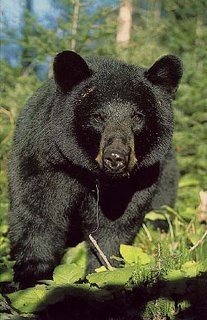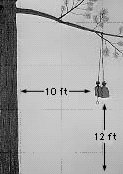When in Black Bear Country

Image: Black Bear (Ursus americanus) courtesy of the National Park Service
Seeing a black bear while camping or hiking in the wilderness can be an exciting or catastrophic experience, the outcome depends upon the circumstances and your “bear” knowledge.
Bears can seem almost human at times, partly because of their high intelligence and partly because they can stand and sit like we do. This can contribute to getting people into “bear” trouble. Most campers never see a bear, especially in years when natural food is abundant. But when natural crops fail, bears sometimes become less cautious of humans.
The best way to avoid trouble is to avoid the bears, which is usually not a problem when hiking because they will usually go out of their way to avoid people. Where the real problem starts is when you stop to camp; you settle down and everything gets quiet but, you have food in camp. So, you need to take precautions to prevent bears from grocery shopping in your camp.
To accomplish this, start by by-passing campsites with bear tracks, fecal droppings, and scattered garbage; bears are regular visitors there and if you must camp at such a site, keep a clean camp. The less food odor in your camp the less chance the bears will linger when they make their rounds. Wash dishes immediately and dump the water away from the camp. Completely and safely burn any edible garbage, including grease, rather than burying it or throwing it in a latrine. Non-burnable garbage should also be hung out of a bears reach and should be packed out when you leave.
Bear-proof food lockers and portable bear-proof containers provide the best protection for your food and are far superior to any alternative. Bear-proof food containers are lightweight and their price is competitive with canvas packs.
If you are camping near your automobile, the next best thing to a bear-proof food container is to store food in the trunk or in sealed plastic bags suspended from a line between two trees. Hang
 food bags at least 10 feet from the nearest tree trunk, and at least 12 feet above the ground. Bears have been known to leap from tree trunks to snatch food bags, and large black bears can reach up nearly 9 feet without jumping. Hanging the bag over a branch is less effective because bears can break small branches and climb out on large ones. If a branch must be used, put the bag far out on the tip of a branch larger than 4 inches in base diameter. Bears sometimes chew through ropes to get hanging food bags, so it is best to counterbalance the bag with a second one, slinging it over a branch, to avoid tying the rope where a bear can bite it.
food bags at least 10 feet from the nearest tree trunk, and at least 12 feet above the ground. Bears have been known to leap from tree trunks to snatch food bags, and large black bears can reach up nearly 9 feet without jumping. Hanging the bag over a branch is less effective because bears can break small branches and climb out on large ones. If a branch must be used, put the bag far out on the tip of a branch larger than 4 inches in base diameter. Bears sometimes chew through ropes to get hanging food bags, so it is best to counterbalance the bag with a second one, slinging it over a branch, to avoid tying the rope where a bear can bite it.Most black bears will not enter a tent with people in it, but it happens and it is still a good idea to keep food and food odors out of tents and sleeping bags. To be on the safe side, wash food from your face and hands before going to bed and hang clothing beyond reach of bears if it has food or cooking grease on it. Perfume may mask human odor, preventing bears from knowing a person is in the tent.
When you hike and (or) camp in bear country be smart and stay safe, and as always, when you go into our National Forest and National Parks leave nothing but footprints and take nothing but what you bring with you, photos, and memories.
Also see: Black Bear in the Blue Ridge Mountains
Technorati Tags: [Blue Ridge][National Park Service][Black Bear][Mountains][camping][hiking][North American][Rockies][Canada][Alaska][United States][US National Parks]












0 Comments:
Post a Comment
<< Home